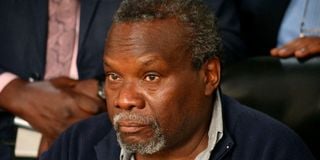
Veteran journalist Macharia Gaitho at the Independent Policing Oversight Authority offices after he was abducted on the morning of July 17, 2024.
For Macharia Gaitho, the torture he endured at the hands of the police this week was but a second baptism of fire.
I have known the bloke since our days at the university and from the times we worked as cab reporters under the tutelage and mentorship of the doyen and father of analytical journalism, the late Hilary Ng’weno, in the late ‘80s.
At the Daily Nation, we shared a corner office and sat next to one another for more than a decade. As I watched that video showing him being violently forced into a car by armed policemen on Wednesday, I felt a chill down my spine.
My mind flashed back to a similar incident Gaitho went through in March 1991 while we were at The Weekly Review.

Veteran journalist Macharia Gaitho at the Independent Policing Oversight Authority offices after he was abducted on the morning of July 17, 2024.
He had been sent to cover a meeting in Elgeyo Marakwet, presided over by the late Nicholas Biwott, who was one of the most dreaded authoritarians of the regime of former President Daniel arap Moi. Gaitho and fellow journalist, Julius Bargorett, were accosted by Biwott’s security detail, locked up in a room and whipped for several hours.
He was lucky to escape alive through that ordeal. I describe last week’s episode as second baptism of fire for my brother in arms because it was not the first time Gaitho was being subjected to terror tactics at the hands of the police.
We have all heard the police spinning the theory that it was a case of mistaken identity and that their target was a blogger by the name, Francis Gaitho.
Let them tell that to the birds. Show me a police investigator who can confuse and mistake the identity of a person whose photograph has been appearing in the biggest newspaper in terms of circulation every single Tuesday for the last 15 years.
Investigators worth their salt would have found out that just about anyone who knows this bloke – from peers and contemporaries from his days at Lenana High School – his former rugby playmates, even family members address Macharia Gaitho as ‘Franjes’. You can’t mistake him for someone else.
The late Philip Ochieng would have unleashed choice words to describe the spin by the police: utter tripe, hogwash, gobbledegook (by the way, is it the Luo word ‘gobble de guok’?).
The bully boys who ordered that terror tactics be inflicted on Gaitho hoped that they would manage to intimidate him out of exercising his right to enjoy the liberty to publish and be damned.
They were dead wrong. Gaitho and my generation are old-fashioned journalists wired to the mindset that the exercise of press freedom does not just stop at holding the government to account.
We were socialised and mentored by Hilary Ng’weno to approach journalism with the mindset and mentality that newspapers must all the time seek to enjoy the juiciest part and aspect of press freedom, namely, the freedom to offend people in authority especially when power leads them to arrogance, hubris, obscene and opulent displays of illegally-acquired wealth.
Risk, personal security and safety must concern all journalist. But in the world of newspapermen of the ilk, training, and mind set of Gaitho, having to endure intimidation by police and people in authority, and the nauve riche is part of the professional hazards that come with your calling.
Autocrats of all ages have since the birth of modern journalism, tried to intimidate and harass journalism. In Kenya, the crackdown has been relenting in severity.
When the police shot Wanjeri Kariuki at point blank in Nakuru, it was not as if the young journalist posed a physical threat to the bully boys. They want a press that bends its knee to power rather speak the truth to it.
The reason Gaitho was being intimidated and harassed by the police was because people in authority like to silence journalist who are too inquisitive. They want to force a culture of self-censorship in newsrooms.
When the authorities ordered Gaitho’s attack and attempted abduction-when they shot and nearly maimed Wanjeri Kariuki, it was not only because they wanted to intimidate and harm the two journalists.
People in authority seek to control the media out of the desire to control what the citizen thinks.
The attempt to abduct Gaitho was a scandalous attack on democracy by the police. Police should focus on fighting actual crime- not policing the freedom of the press.







